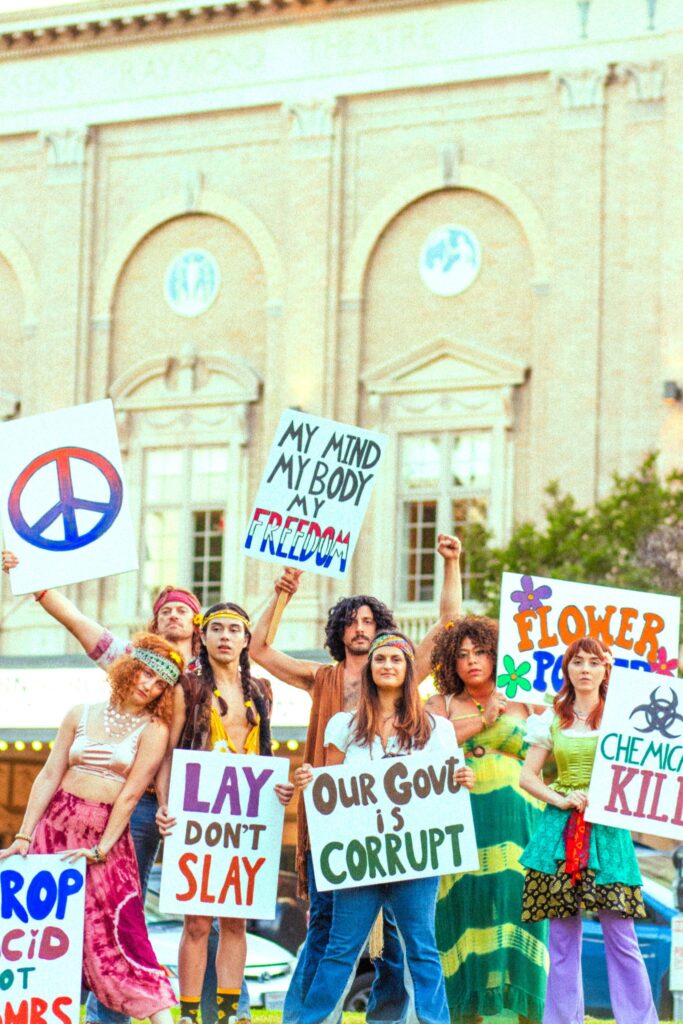Altadena Music Theatre presents Hair. Book by Gerome Ragni and James Rado. Music by Galt MacDermot. Director Oliver Azcarate. Producer Sarah Azcarate.
The flower children are back on stage, this time at the Altadena Music Theatre. This revival, sans the nudity, offers an outstanding choreography and killer musical numbers that bring back memories of a turbulent but hopeful era in American history.
The literary concepts of the Beat Generation eventually merged with the hippie counterculture movement and led to sexual freedom and drug experimentation. Looking for the meaning of life and in opposition to the brutality of war, the generation of the late 60s turned to eastern philosophy, incorporating Hindu and Buddhist beliefs into their lifestyles. Their peace and love values still reverberate today. Did their counterculture movement have a permanent effect on modern society? Or, was it just an ephemeral utopia?
Hair, which opened off-Broadway a few months after the Summer of Love in 1967, offered a controversial way to experience theatre, depicting drug use, nudity, and a defying anti-war message.
The Altadena Music Theatre’s production captures the same powerful message of love, freedom, and experimentation that defined a society dissatisfied with the conservatism of the era and the discouraging news from the American front in Vietnam. The Tribe, lead by Claude (Daniel Hartman), Berger (Steve Mazurek), and Sheila (Sarah Azcarate) believe to be tuned in to the Age of Aquarius, experiencing a higher state of consciousness. This, of course, with the aid of drugs like LSD and marihuana. Director Oliver Azcarate recreates the effects of psychedelics in a sensuous choreography and soft lighting for a dramatic effect. The choreography, by the way, is a relevant element in Hair. Melissa Schade‘s expressive choreography paired up with Chris Wade‘s fantastic music direction is a combination that delivers a fluid, energetic, and captivating performance. Sexuality is also an important feature in Hair. It is a defiance and a symbol of acceptance and experimentation, a common practice in the hippie communes. Azcarate also uses choreography and lighting to depict what togetherness meant for the hippies.
The extraordinary acting of secondary characters like Margaret Meade (Michael Mullen) and Woof (Cruz St. James, Cabaret) add to the overall quirkiness of the play. This staging highlights prominently Claude’s mixed emotions. He has to make a decision. There are only two options: Either to relent to the pressure and go to Vietnam or stick to the Tribe’s firm opposition to the war. The consequences of his choice are portrayed poignantly, extracting the spirit of the play in a powerful manner.
This is an exceptional group of talented actors, singers, and dancers that engage the audience in a magical night under the stars in the historic Charles S. Farnsworth Park.
Hair
Charles Farnsworth Amphitheater
568 Mount Curve Ave. E
Altadena, CA 91001
September 14-24th, 2023 Thurs – Sun
SHOWTIME: 8:00 PM
Special Pre-Show Experience @ 7:30PM
Tickets: altadenamusictheatre.com/hair2023
Book by Gerome Ragni and James Rado. Music by Galt MacDermot. Producer Sarah Azcarate. Director Oliver Azcarate. Choreographer Melissa Schade. Music Direction Chris Wade.




































